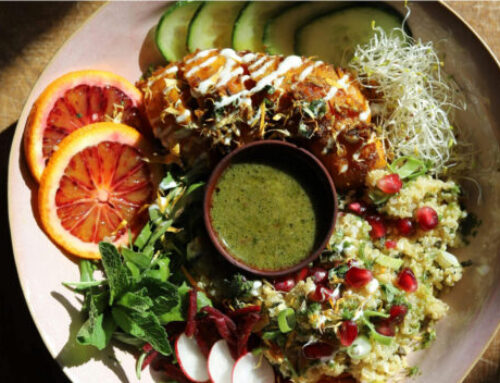Plan Ahead and Savor the Rewards with Mindful Meal Prep!
First, let’s define mindful meal prep and explain why it has grown in popularity. Meal prep, short for meal preparation, refers to planning, preparing, and packaging meals or snacks in advance. Meal prep means different things to different people. It can range from cooking an entire week’s worth of meals in one go to simply chopping vegetables or portioning out ingredients ahead of time. It’s a flexible approach catered toward individual schedules, making it suitable for various lifestyles. The primary thing that comes to mind with meal prep is saving time, reaching nutritional goals, and reducing food waste.
Personally, I hate having to throw out food that has gone bad, including those hidden in the bottom vegetable tray. However, if I don’t prep them, they are out of sight and mind and more likely have to be thrown out. It would be better for my budget if I prepped them in advance.
With increasingly busy schedules, many find it challenging to prepare healthy, home-cooked meals daily—or at least I do. Mindful meal prep offers a solution, allowing each of us to take control of our diet while minimizing the stress of last-minute cooking. Meal prepping has also gained traction as part of a movement toward mindful eating, emphasizing balance, portion control, and sustainability. You can find countless meal prep videos on YouTube for inspiration.
Let’s Address Why Meal Prep has Become Essential and How it can Transform How We Approach Food
Incorporating meal prep into your routine unlocks many benefits that improve your daily life and overall well-being. We will discuss some of the benefits of meal prep, starting with the most obvious: saving time.
Stocking your kitchen with wholesome, healthy staples is key to maintaining a balanced diet. These include a variety of fresh fruits, vegetables, whole grains, lean proteins, and healthy fats. With these readily available essentials, you can stay on track and avoid less nutritious options, inspiring you to create exciting and delicious meals.
Get Ready:
To get started with mindful meal prep and to help you have a smooth and successful experience, consider the following steps:
- Set Aside Dedicated Time: Block a specific time a few times a month, or if you prefer, incorporate time into your weekly schedule to focus on meal prep. Choose a day when you have the most free time and energy, such as a Sunday afternoon or evening, to dedicate to planning and preparing your meals.
- Plan Your Menu: Decide the meals you want to prepare for the week ahead. Consider your dietary preferences, nutritional needs, and any specific goals you have, such as weight loss or muscle gain. Good practice should include a well-rounded and nourishing diet complete with protein, fruits and vegetables, and other considerations that complement your health goals.
- Create a Shopping List: Once you plan your menu, creating a weight loss-friendly shopping list is a practical step toward success. Make a detailed list by category or department to help you stay organized. I often forget to check my pantry before shopping; it is a good habit to implement to save money and not duplicate items you may already have.
- Grocery Shopping: Plan your grocery store trip ahead of time. Google or ask the clerk at checkout when the store is the slowest for future consideration. Shopping is always easier when you don’t need a traffic light in the aisles to avoid cart collisions. Or, my favorite, shop online to gather all the ingredients on your list. Try and stay with what is on your list to avoid unnecessary spending and impulse purchases.
Let’s Get to it!
- Preparation and Cooking: Set aside a few hours to prepare your weekly meals. Start by washing and chopping vegetables, marinating proteins, etc. Cook in batches to save time, and portion your meals for easy grab-and-go access throughout the week. Use this as an opportunity to prep one additional meal for the freezer for when you don’t have time or feel like food prepping.
- Storage and Labeling: Proper storage is necessary to maintain the freshness. Use airtight containers and label each container with the meal and any special instructions, along with the date prepared or expiration date, whichever you prefer. When I freeze future meals, I mark my containers with the best-by date (a maximum of three months out).
- Reheating and Enjoying: Now for the best part. When it’s time to eat, grab an already-prepped meal from the refrigerator; you only have to reheat it. I prefer the oven over the microwave, but do what’s easiest for you. Enjoy the convenience of readily available nutritious meals and savor the benefits.
By following these steps and incorporating best practices, such as proper meal planning, smart grocery shopping, efficient cooking techniques, and organized storage, you’ll be well on your way to mastering the art of meal prep and reaping its countless benefits.
Benefits of Mindful Meal Prep: What’s in it for Me?
Meal prep offers many benefits that can enhance your lifestyle and well-being. Now that you’ve done the work, experience the rewards:
- Saves Time: One of my favorite benefits of meal prep is that it saves me valuable time during busy days. Dedicating just a few hours a week eliminates the need to cook daily, freeing time for other activities or much-needed relaxation.
- Promotes Healthy Eating: By having balanced meals already prepped, you can avoid relying on unhealthy takeout or convenience foods while consuming a variety of nutritious foods.
- Saves Money: You can save money by making a detailed grocery list and avoiding impulsive purchases and unnecessary food waste. This list helps optimize your grocery budget and reduce overall food expenses.
- Reduces Stress: Knowing that you have prepared meals, now you can say goodbye to the last-minute rush and enjoy a hassle-free meal time.
- Portion Control: Meal prep allows you to maintain portion control and manage your calorie intake for that daily deficit. Taking this step can help you lose or maintain a healthy weight.
- Increases Variety: Meal prep allows you to experiment with different recipes and flavors. You can avoid boredom by using a diverse range of ingredients and trying different types of cuisines.
By embracing the practice of mindful meal prep, you can enjoy these benefits and more, making your daily meals healthier, easier, and more enjoyable.
How to Plan Your Meals
Planning your meals allows you to tailor your preferences and dietary needs and is vital to successful meal prep. Here are some best practices to help you in the planning process:
- Set Your Goals: Whether you’re aiming for weight management, increased energy levels, or improved overall nutrition, determine your health and wellness goals. These goals will guide your meal-planning choices.
- Consider Your Schedule: Consider your daily routine, including work hours, exercise, and other commitments. Identify the number of meals and snacks you need to plan for each day.
- Create a Weekly Menu: Develop a weekly menu that includes some of your favorite recipes. Experiment with different flavors to keep your meals interesting. Incorporate a mix of proteins, whole grains, and a variety of fruits and vegetables.
- Balance Your Nutrients: Ensure your meals include healthy carbohydrates and fats, with plenty of vitamins and minerals to meet your nutritional needs.
- Make a Shopping List: Once you plan your weekly menu, create a list that includes all the ingredients you’ll need, avoiding additional trips to the grocery store.
- Prep in Bulk: Cook staple ingredients such as grains, proteins, and vegetables in batches that you can use for future meals.
- Get Creative: Experiment with different herbs, spices, and cooking techniques to add variety to your meals. Trust your taste buds; they are sure to give you feedback.
- Stay Flexible and Open to Change: Remember that meal planning is a tool to help you stay on track, but it doesn’t have to be rigid. Allow some flexibility and adjust your plans as needed to accommodate unexpected cravings.
By following these best practices, you can create a meal-planning routine that is personalized to your likes, fits your lifestyle, and helps you achieve your health, wellness, or weight loss goals.
Tips and Tricks for Successful Mindful Meal Prep
Mastering the art of meal prep requires a few tips and tricks to make the process smoother and more enjoyable. Here are some some ideas to enhance your meal planning and preparation journey:
- Plan Ahead: Take some time each week to plan your meals. Choose your recipes, create a shopping list, and schedule a dedicated prep time.
- Batch Cooking: Cook larger meals and divide them into individual servings, allowing you to use ingredients efficiently and portion control your meals.
- Prep in Stages: Break down your meal prep process into manageable stages. Start by washing and chopping vegetables, marinating proteins, and prepping sauces and dressings. This way, assembling meals during the week becomes a breeze.
- Invest in Storage Containers: High-quality storage containers are essential for keeping your prepped meals fresh and organized. Choose microwave-safe, leak-proof, and stackable containers for easy storage in the refrigerator or freezer.
- Portion Control: Remember portion sizes while prepping meals that align with your dietary goals. Use measuring cups, food scales, or portion control containers to help maintain appropriate portions.
- Stay Organized: Keep your refrigerator and pantry well-organized, making finding ingredients easier and reducing waste.
- Make it Enjoyable: Play music, listen to a podcast, have a glass of wine, or involve family members to make meal prep fun and engaging. Enjoy the process, unwind, and nourish your body.
By incorporating these tips and tricks into your meal prep routine, you’ll be well on your way to creating delicious, nutritious, and convenient meals that support your health and wellness goals.
Overcoming Common Challenges
Meal prepping may seem daunting at first, you may experience challenges however, with dedication, you can make it a seamless part of your routine. Here are some of the most common objections people have to meal prepping and solutions to each challenge:
Lack of Time: Many individuals perceive meal prepping as time-consuming. Save precious hours during busy weekdays by spending a small amount of time upfront.
- Avoid last-minute indecision by advanced meal planning.
- Prep ingredients in bulk, such as chopping vegetables or cooking grains, to streamline the process.
- Kitchen gadgets can be your friend.
Boredom and Lack of Variety: Some worry that meal prepping will limit their food choices and lead to repetitive meals. To combat this challenge:
- Experiment with different flavors, herbs, and spices to add variety to your meals.
- Explore new recipes and cuisines to keep your taste buds excited.
- Rotate your meal plans weekly to introduce different ingredients and flavors.
Storage and Portability: Concerns about storing and transporting prepped meals often arise. Here’s how you can address these issues:
- Invest in quality food containers that are leak-proof and microwave-safe.
- Separate sauces and dressings from the main dish to prevent sogginess if possible.
- Use portion-controlled containers to aid in easy grab-and-go options.
Perceived Lack of Freshness: Some worry that prepped meals won’t taste as fresh as ones cooked in real-time. To preserve freshness:
- Storing prepped meals in airtight containers in the refrigerator or freezer will provide optimal freshness.
- Consider incorporating fresh ingredients like herbs or toppings just before consuming to enhance flavors and textures.
By addressing these common objections, you’ll have a better time meal prepping.
Nutritional Considerations for Mindful Meal Prep
Regarding meal prep, it’s important to remember the nutritional aspects to ensure you’re fueling your body with the proper nutrients. While providing general guidelines, it’s essential to personalize your meal prep according to your individual nutritional needs. Here are some simple considerations for a nutritious meal prep:
- Fruit and Vegetable Variety: Include a wide range of fruits and vegetables in your diet for maximum nutritional benefits. Remember, Eating more fruits and vegetables can make all the difference in your daily caloric deficit.
- Whole Grains: Choosing these will provide fiber, vitamins, and minerals.
- Lean Protein: To sustain muscle, include lean protein sources such as chicken, fish, tofu, or legumes.
- Healthy Fats: Incorporate sources of healthy fats to support brain function and overall health.
- Portion Control: Pay attention to portion sizes to maintain a healthy balance of calories and avoid overeating.
- Personalization: Adjust your meal prep according to your specific dietary needs, food preferences, and any health conditions you may have.
Considering these nutritional aspects, you can tailor your meal prep to your individual needs and goals. Enjoy the convenience and cost-effectiveness of prepping your meals in advance to optimize your health and well-being.
Budget-Friendly Meal Prep Ideas
Regarding meal prep, saving money while enjoying delicious and nutritious meals is possible. Here are some budget-friendly meal prep ideas to help you make the most of your ingredients and optimize your grocery budget:
- Plan Your Meals: Plan your meals for the week ahead to help you create a shopping list and avoid unnecessary purchases.
- Buy in Bulk: Purchase ingredients in bulk, especially pantry staples like rice, pasta, and beans, to assist with more cost-effective budget practices.
- Seasonal and Sale Items: Opt for seasonal produce and watch for sales of fruits and vegetables. When in season, these items are often more affordable.
- Repurpose Leftovers: To minimize food waste, transform leftover ingredients into new dishes. For example, roast a whole chicken for one meal and use the leftover meat to make sandwiches or salads for another meal.
- Make Use of Affordable Proteins: Incorporate budget-friendly proteins like eggs, canned tuna, beans, and lentils into your meal prep. These options are not only economical but also rich in nutrients.
Implementing these budget-friendly meal prep ideas will allow you to maximize your ingredients while keeping your grocery costs in check. Enjoy the convenience and savings of meal prep while still savoring delicious and healthy homemade meals.
Best Practices for Storing and Reheating Meals
Proper storage and reheating of prepped meals is essential for maintaining food safety and quality. Here are some best practices to follow:
- Storage Containers: Choose high-quality, airtight containers specifically designed for food storage. Glass or BPA-free plastic containers are ideal.
- Refrigeration: Store prepped meals in the refrigerator within two hours of cooking. Ensure the refrigerator temperature is below 40°F (4°C) to prevent bacterial growth.
- Labeling Meals: Label each container with the meal-type and preparation date.
- Freezing: If you plan to store meals for longer than two days, consider freezing them. Divide meals into individual portions and use freezer-safe containers or bags. I generally keep frozen meals for a maximum of three months.
- Thawing: Thaw frozen meals in the refrigerator overnight or use the defrost setting on your microwave. I choose not to thaw at room temperature so I don’t have to worry about the potential growth of bacteria.
- Reheating: Most people know the basics of reheating. However, it’s a good practice to check the temperature using a food thermometer. Most labels mention ensuring the food reaches a safe internal temperature of 165°F (74°C) to kill potential bacteria, for example, a turkey breast. For reheating in the microwave, stir the food and rotate the container to ensure even heating.
- Storage Lifespan: Follow general guidelines for the storage lifespan of different food items to ensure they are consumed within safe limits.
By following these best practices, you can enjoy the convenience of prepped meals that remain delicious and healthy throughout the week.
To Wrap it up:
In conclusion, mindful meal prep offers a multitude of benefits that go beyond convenience. By investing a little time and effort in prepping meals in advance, you can enjoy the convenience of ready-to-eat dishes throughout the week while reaping the rewards of improved health, nutrition, and budget management. Meal prep allows you to take control, providing your body with nourishing and wholesome meals instead of relying on quick and potentially unhealthy takeout options. Moreover, with proper storage and safety practices, you can enjoy your meals while reducing food waste. So, why not embrace the art of meal prep and embark on a journey of healthy eating and time-saving benefits? Start today and experience the transformative power of this simple yet impactful practice.
Happy meal prepping!




